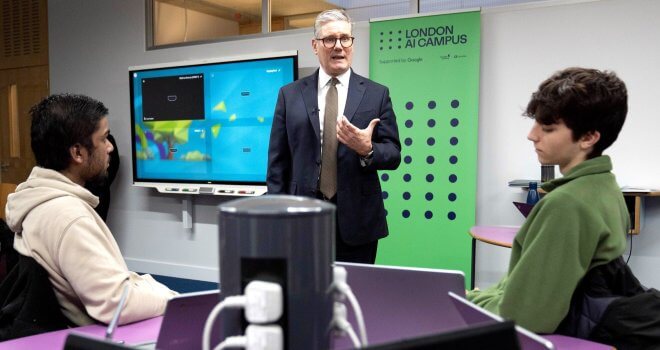Three Ways To Support Young Project Professionals In Their Career Journeys

As the world becomes more project-based, the demand for project talent is rising. Research by my organization, Project Management Institute (PMI), shows that the global economy will need 25 million new project management professionals by 2030. And project management is now among the most in-demand soft skills in a ZipRecruiter analysis of job postings on its platform.
Fortunately, young professionals seem to have gotten the message. Seventy-one percent of young professionals in our recent Job Prospect Survey expect project management skills to be part of their career. And 80 percent are interested in pursuing a career in project management.
This leads to an interesting question: What resources, tools and upskilling opportunities do we as project leaders need to provide to bring more young professionals into the profession? Here are three suggestions:
Mentoring
The value of mentoring has been well documented. More than nine in 10 workers who have a mentor (91 percent) in the CNBC/SurveyMonkey Workplace Happiness Survey say they are satisfied with their jobs, including 57 percent who say they are “very satisfied.”
Mentees in the survey are also more likely than their colleagues without mentors to say they are well paid (79 percent vs. 69 percent) and that their contributions are valued (89 percent vs. 75 percent) – two components of overall happiness at work. In addition, our recent Workplace Engagement Survey found that two-thirds of young professionals see value in having or becoming a mentor to someone outside their current company.
Mentorship is critical in the project management field because young professionals need to understand not only our profession’s tools and methodologies but also the larger context behind a project. By becoming mentors, we can help provide this vision and help our mentees connect their day-to-day work to the larger organizational strategy and objectives.
A seasoned mentor can also help young professionals understand the importance of power skills – those interpersonal skills like collaborative leadership, communication, and empathy that play an immense role in a project’s success.
Virtually all employers – 93 percent – say that power skills play a critical role in their decision about who to hire, according to ZipRecruiter’s recent report: The Job Market Outlook for Grads. And 92 percent of project managers in PMI’s 2023 Pulse of the Profession® report agree that power skills help them work smarter.
After five years in Operations, I benefited greatly from mentors when I first entered the project management field. One of my cubemates, for example, served as an early role model and shared valuable knowledge. And my first boss offered helpful encouragement and support in my dealings with senior business leaders.
I believe those of us who have benefited from mentorship should pay it forward by mentoring promising young professionals in our organizations – including those who may be new to project management, or transitioning into the profession.
Memberships
Young professionals can also build their knowledge and hone their project management skills by connecting with other like-minded professionals. We do this most naturally, of course, in the workplace, as we work alongside colleagues of different backgrounds and skillsets. But membership in professional organizations can also answer the need and deliver other important benefits.
When I came to the United States, I sought PMI and chapter membership. I received a tremendous amount of support from my local PMI chapter community in South Dakota. I was able to tap into the knowledge and experience of our more seasoned members, and the community provided much psychological and emotional support.
Many professional organizations also offer more tangible membership benefits, including discounts on certification exam fees, networking events, free workshops and webinars, and valuable tools and templates. In many cases, there’s also an opportunity to give back to the local community through volunteer events and activities. As a bonus, volunteering to lead these initiatives helps young professionals build leadership skills to support their careers.
The good news is that young professionals already have a perceived sense of the impact a professional organization can provide. PMI research found that young professionals believe a professional organization membership would provide them with networking (48 percent), professional development (43 percent), and fulfillment (59 percent). It’s our job to reiterate the value and point them in the right direction.
Professional Certifications
Professional certifications may be on their way to replacing MBAs as the career booster of choice for young professionals. Sixty-five percent of young professionals in PMI’s Job Prospect Survey agree that having a relevant professional certification is more valuable than having an advanced degree.
The benefits associated with professional certifications include higher earnings potential (cited by 45 percent of young professionals), an improved resume (38 percent), professional credibility (36 percent), and career advancement opportunities (33 percent).
On a positive note, 32 percent of young professionals already have a certification, but employers could potentially boost that number if they agreed to reimburse employees for the costs associated with obtaining and keeping a certification. Indeed, 76 percent of young professionals say they would likely pursue a certification if their employer offered reimbursement.
This would undoubtedly benefit both employer and employee. In fact, data from my organization found that holders of our one certification, which covers the fundamentals of project management, are now in more senior positions than when they first obtained the certification.
All these steps can help draw more young professionals into the project management community. But one final word of caution: young professionals have been severely tested over the past few years of COVID lockdowns and remote working arrangements.
As a result, they report experiencing negative work-related emotions at significantly higher rates than the average office worker. As we bring these young professionals into our community, we must work extra hard to provide the skills, support, and mentorship opportunities they need to thrive in this new world.
Karla Eidem is North America Regional Operations Manager at Project Management Institute.




